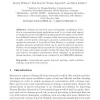Free Online Productivity Tools
i2Speak
i2Symbol
i2OCR
iTex2Img
iWeb2Print
iWeb2Shot
i2Type
iPdf2Split
iPdf2Merge
i2Bopomofo
i2Arabic
i2Style
i2Image
i2PDF
iLatex2Rtf
Sci2ools
ISNN
2011
Springer
2011
Springer
Robust Multi-stream Keyword and Non-linguistic Vocalization Detection for Computationally Intelligent Virtual Agents
Abstract. Systems for keyword and non-linguistic vocalization detection in conversational agent applications need to be robust with respect to background noise and different speaking styles. Focussing on the Sensitive Artificial Listener (SAL) scenario which involves spontaneous, emotionally colored speech, this paper proposes a multi-stream model that applies the principle of Long Short-Term Memory to generate contextsensitive phoneme predictions which can be used for keyword detection. Further, we investigate the incorporation of noisy training material in order to create noise robust acoustic models. We show that both strategies can improve recognition performance when evaluated on spontaneous human-machine conversations as contained in the SEMAINE database.
| Added | 15 Sep 2011 |
| Updated | 15 Sep 2011 |
| Type | Journal |
| Year | 2011 |
| Where | ISNN |
| Authors | Martin Wöllmer, Erik Marchi, Stefano Squartini, Björn Schuller |
Comments (0)

